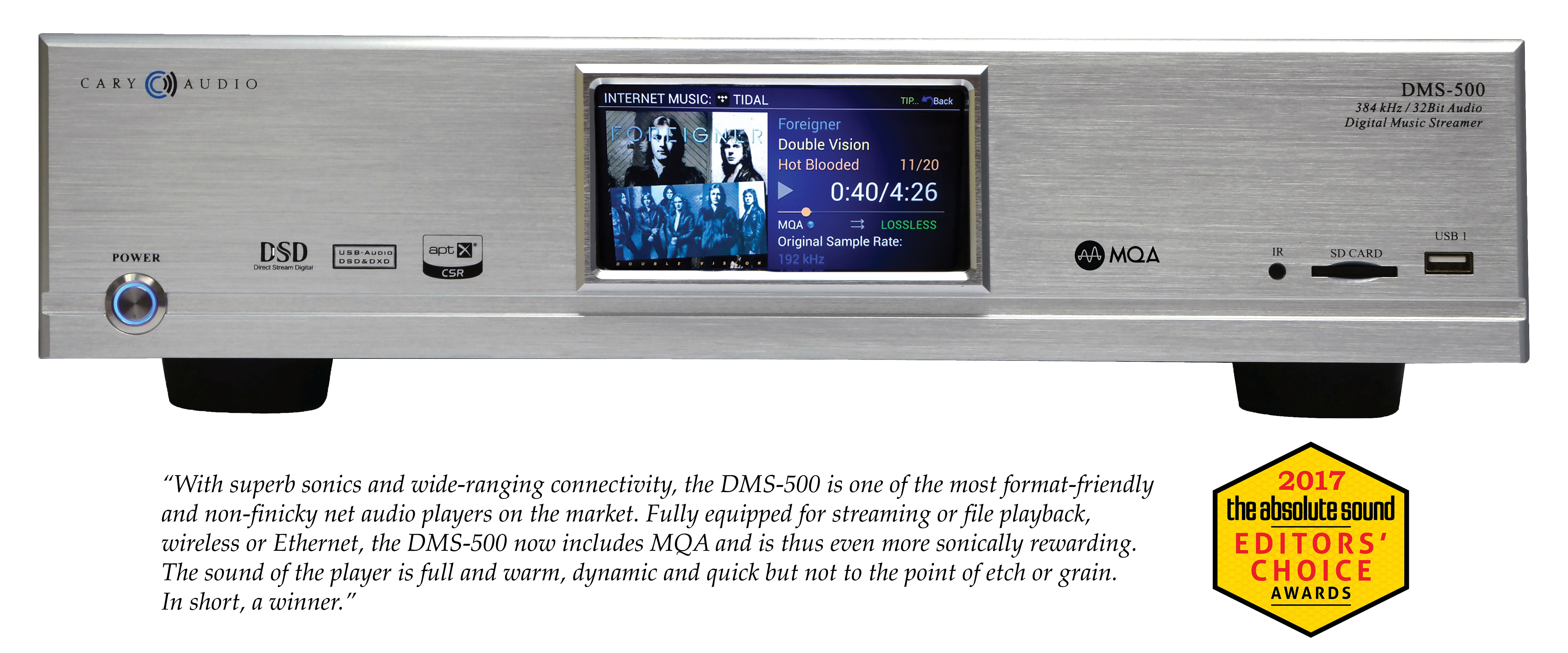Bob Stuart, creator of MQA, created a blog post that discusses the different levels and platforms of the MQA technology. Below are some basic takeaways from the article that we feel will help our customers understand MQA and the advantages of using it with the DMS-500 and future Cary Audio MQA certified products.
FACT: NOT ALL MQA PLATFORMS ARE EQUAL. WHAT DOES THIS MEAN AND WHAT ARE THE PLATFORMS?
FULL DECODER WITH DAC PLATFORM
This is an audio hardware component (DAC) that has the MQA decoder built into the unit. In Bob’s words, “The MQA file can be fully unfolded to recover the exact sound of the studio preview using a Full Decoder. This is the highest possible sound quality.” The Cary Audio DMS-500 is a full MQA decoder with a DAC. This means the DMS-500 can play MQA files via internet streaming (like TIDAL), network computer streaming over Ethernet or Wi-Fi, direct file playback from USB connected hard drives, flash drives or SD Card to the highest level MQA is currently capable of, which is 24 bit/384 kHz. In doing so, the Full Decoder/DAC solution also offers user interface “MQA” notification and provenance of the MQA files. The DMS-500 also has an extra trick up its sleeve we’ll discuss at the end under The Cary Audio Advantage.
MQA CORE – USING A COMPUTER WITH SOFTWARE DECODING AND A USB DAC:
WITH A NON-MQA DAC
This requires the use of a USB DAC connected to the computer via a USB cable. The DAC does not need to be an MQA DAC as the software decoding on the computer will process MQA up to a LIMIT of 88.2 or 96 kHz. For example, if the MQA files original sample rate was 192 or 384 kHz, it would downgrade the signal to 88.2 or 96 kHz. Practical examples would be running something like TIDAL or Roon software (once MQA Core is implemented) on a laptop and connecting it to a non-MQA USB DAC. This would be considered something akin to a “light” version of MQA. Additionally, the DAC would not show any “MQA” notification or provenance.
WITH A MQA DAC
What if the USB DAC had an MQA decoder built in? In this instance, the MQA USB DAC would still be receiving the “not fully unfolder” MQA file, but the MQA USB DAC would then continue the process of “completely unfolding” the MQA file to the MQA DACs highest capability. So, if the MQA USB DAC taps out at 24 bit/192 kHz and the original sample rate of the MQA file was 384 kHz, you’d only experience a truncated 192kHz version of the MQA file. If the MQA USB DAC was capable of native 384kHz PCM, then you would receive the complete file with “MQA” notification but no provenance.
IMPORTANT NOTE: Bob’s words, “Since the MQA Core signal is at a higher rate (generally 88.2 or 96 kHz) a listener with a suitable DAC can enjoy a better (but not fully optimised) sound. Sound quality is higher than from ‘No’ or ‘Authenticating’ decoders but lower than a ‘Full’ decoder.”
MQA RENDERER
As the blog states, this is a low cost, lightweight solution. This approach is used in devices limited in their native PCM sample rate ability and only have the ability to receive an MQA signal from a single or limited input sources. Bob’s words, “An MQA Renderer will indicate ‘stream lock’ but is not able to decode an MQA stream or Authenticate it. This type of device is available for portable applications.”
Authenticated: A DAC or portable device designed to play MQA files that can only play at one rate such as 44.1 or 48 kHz.
No Decoder: Any digital player/playback device that has no MQA decoding or playback ability whatsoever. However, any non-MQA device can play the MQA file in its plain native file format of FLAC, WAV, etc.
THE CARY AUDIO ADVANTAGE
First, it’s worth noting that the DMS-500 network audio player is fully certified by MQA and spent many months in the hands of MQA engineers, including Bob, in implementing a full decoder solution into these products. That being said, our hardware is uniquely capable of playing back native PCM files up to 768 kHz. The DMS-500 receives and decodes MQA files to MQA’s highest ability, of which is currently 384 kHz. Since we can actually process 768 kHz, MQA customized our decoder to expand (further render) all MQA files to 768kHz, something no other product can currently do. This also means when or if MQA expands their capability to native 768 kHz, the DMS-500 will already be able to handle them.





